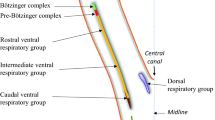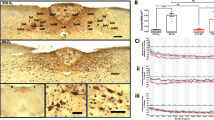Abstract
Rationale
The nonselective adenosine receptor antagonist caffeine is used clinically to treat apnea in preterm infants. The brain developmental stage of preterm infants is usually at a period of rapid brain growth, referred as brain growth spurt, which occurs during early postnatal life in rats and is highly sensitive to central nervous system (CNS) acting drugs.
Objectives
The aim of this work was to study whether caffeine treatment during brain growth spurt produces long-term effects on the adenosine receptor-regulated behaviors including nociception, anxiety, learning, and memory.
Methods
Neonatal male and female Sprague–Dawley rats were administered either deionized water or caffeine (15–20 mg kg−1 day−1) through gavage (0.05 ml/10 g) over postnatal days (PN) 2–6. The hot-plate test, elevated plus-maze, dark-light transition test, and step-through inhibitory avoidance learning task were examined in juvenile rats. Furthermore, the responses to adenosine A1 receptor agonist N(6)-cyclopentyladenosine (CPA)-induced hypothermia and A2A receptor agonist CGS21680-induced locomotor depression were also compared.
Results
Caffeine-treated rats showed hyperalgesia in hot-plate test, less anxiety than controls in the elevated plus-maze and dark–light transition, and impairment in step-through avoidance learning test. Moreover, the responses to CPA-induced hypothermia and CGS21680-induced locomotor depression were enhanced in caffeine-treated rats.
Conclusion
These results indicate that caffeine exposure during brain growth spurt alters the adenosine receptor-regulated behaviors and the responsiveness to adenosine agonists, suggesting the risk of adenosine receptor-related behavioral dysfunction may exist in preterm newborns treated for apnea with caffeine.






Similar content being viewed by others
References
Aden U, Herlenius E, Tang LQ, Fredholm BB (2000) Maternal caffeine intake has minor effects on adenosine receptor ontogeny in the rat brain. Pediatr Res 48:177–183
Bhattacharya SK, Satyan KS, Chakrabarti A (1997) Anxiogenic action of caffeine: an experimental study in rats. J Psychopharmacol 11:219–224
Comer AM, Perry CM, Figgitt DP (2001) Caffeine citrate: a review of its use in apnoea of prematurity. Paediatr Drugs 3:61–79
El Yacoubi M, Ledent C, Parmentier M, Costentin J, Vaugeois JM (2000) The anxiogenic-like effect of caffeine in two experimental procedures measuring anxiety in the mouse is not shared by selective A(2A) adenosine receptor antagonists. Psychopharmacology 148:153–163
Etzel BA, Guillet R (1994) Effects of neonatal exposure to caffeine on adenosine A1 receptor ontogeny using autoradiography. Brain Res Dev Brain Res 82:223–230
Fisher S, Guillet R (1997) Neonatal caffeine alters passive avoidance retention in rats in an age- and gender-related manner. Brain Res Dev Brain Res 98:145–149
Gannon BA (2000) Theophylline or caffeine: which is best for apnea of prematurity? Neonatal Netw 19:33–36
Ghelardini C, Galeotti N, Bartolini A (1997) Caffeine induces central cholinergic analgesia. Naunyn Schmiedebergs Arch Pharmacol 356:590–595
Gimenez-Llort L, Fernandez-Teruel A, Escorihuela RM, Fredholm BB, Tobena A, Pekny M, Johansson B (2002) Mice lacking the adenosine A1 receptor are anxious and aggressive, but are normal learners with reduced muscle strength and survival rate. Eur J Neurosci 16:547–550
Guillet R (1990) Neonatal caffeine exposure alters adenosine receptor control of locomotor activity in the developing rat. Dev Pharmacol Ther 15:94–100
Guillet R, Dunham L (1995) Neonatal caffeine exposure and seizure susceptibility in adult rats. Epilepsia 36:743–749
Guillet R, Kellogg C (1991a) Neonatal exposure to therapeutic caffeine alters the ontogeny of adenosine A1 receptors in brain of rats. Neuropharmacology 30:489–496
Guillet R, Kellogg CK (1991b) Neonatal caffeine exposure alters developmental sensitivity to adenosine receptor ligands. Pharmacol Biochem Behav 40:811–817
Hauber W, Bareiss A (2001) Facilitative effects of an adenosine A1/A2 receptor blockade on spatial memory performance of rats: selective enhancement of reference memory retention during the light period. Behav Brain Res 118:43–52
Johansson B, Halldner L, Dunwiddie TV, Masino SA, Poelchen W, Gimenez-Llort L, Escorihuela RM, Fernandez-Teruel A, Wiesenfeld-Hallin Z, Xu XJ, Hardemark A, Betsholtz C, Herlenius E, Fredholm BB (2001) Hyperalgesia, anxiety, and decreased hypoxic neuroprotection in mice lacking the adenosine A1 receptor. Proc Natl Acad Sci USA 98:9407–9412
Khisti RT, Chopde CT, Abraham E (2000) GABAergic involvement in motor effects of an adenosine A(2A) receptor agonist in mice. Neuropharmacology 39:1004–1015
Ledent C, Vaugeois JM, Schiffmann SN, Pedrazzini T, El Yacoubi M, Vanderhaeghen JJ, Costentin J, Heath JK, Vassart G, Parmentier M (1997) Aggressiveness, hypoalgesia and high blood pressure in mice lacking the adenosine A2a receptor. Nature 388:674–678
Leon D, Albasanz JL, Ruiz MA, Fernandez M, Martin M (2002) Adenosine A1 receptor down-regulation in mothers and fetal brain after caffeine and theophylline treatments to pregnant rats. J Neurochem 82:625–634
Ohno M, Watanabe S (1996) Working memory failure by stimulation of hippocampal adenosine A1 receptors in rats. Neuroreport 7:3013–3016
Pereira GS, Rossato JI, Sarkis JJ, Cammarota M, Bonan CD, Izquierdo I (2005) Activation of adenosine receptors in the posterior cingulate cortex impairs memory retrieval in the rat. Neurobiol Learn Mem 83:217–223
Sawynok J, Reid AR, Doak GJ (1995) Caffeine antinociception in the rat hot-plate and formalin tests and locomotor stimulation: involvement of noradrenergic mechanisms. Pain 61:203–213
Schmidt B (2005) Methylxanthine therapy for apnea of prematurity: evaluation of treatment benefits and risks at age 5 years in the international Caffeine for Apnea of Prematurity (CAP) trial. Biol Neonate 88:208–213
Ticho SR, Radulovacki M (1991) Role of adenosine in sleep and temperature regulation in the preoptic area of rats. Pharmacol Biochem Behav 40:33–40
Wang JH, Ma YY, van den Buuse M (2006) Improved spatial recognition memory in mice lacking adenosine A(2A) receptors. Exp Neurol 199:438–445
Acknowledgements
This work was supported by a grant (NSC90-2320-B-320-012) from National Scientific Council and a grant (TCMRC-ST-93080-1) from Tzu Chi University.
Author information
Authors and Affiliations
Corresponding author
Rights and permissions
About this article
Cite this article
Pan, HZ., Chen, HH. Hyperalgesia, low-anxiety, and impairment of avoidance learning in neonatal caffeine-treated rats. Psychopharmacology 191, 119–125 (2007). https://doi.org/10.1007/s00213-006-0613-y
Received:
Accepted:
Published:
Issue Date:
DOI: https://doi.org/10.1007/s00213-006-0613-y




